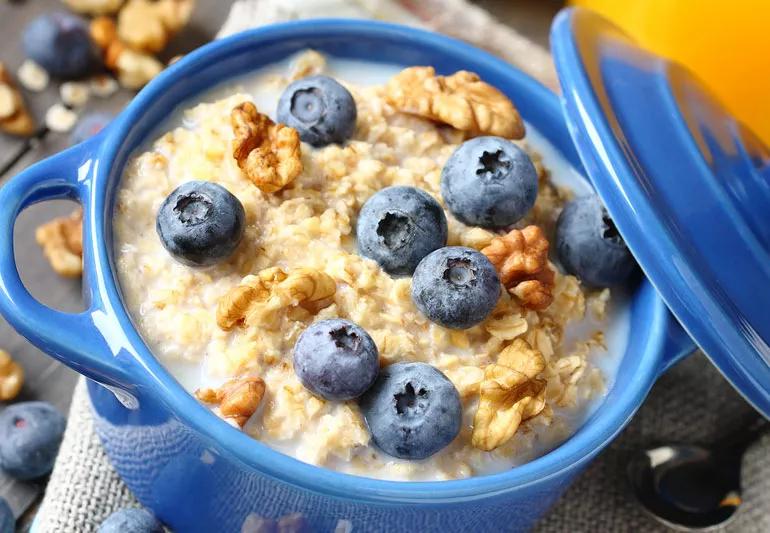Plus 6 ways a heart dietitian can help you

Advertisement
Cleveland Clinic is a non-profit academic medical center. Advertising on our site helps support our mission. We do not endorse non-Cleveland Clinic products or services. Policy
Have diabetes or hypertension raised your risk of heart disease, or do you simply want to eat in a more heart-healthy way? A three-day meal plan can help. This 1,500-calorie plan can help women maintain their weight and can help smaller men lose weight, says Julia Zumpano, RD, LD. (Discover the six benefits of seeing a heart dietitian below.)
Breakfast: 2 large eggs, 2 slices whole grain bread, peanut butter.
Lunch: 2 slices whole grain bread, 1 can tuna (packed in water), 1 slice low-fat mozzarella cheese, 1 Tbsp. olive oil mayo, 1 cup skim milk, 6 baby carrots, 1 Tbsp. light dressing.
Dinner: 4 oz. grilled chicken, 1 cup sweet potato, 1 cup green beans, ½ Tbsp. olive oil spread, 1 medium apple, 1 cheese stick.
Snacks: ½ cup fresh pineapple, ½ cup cottage cheese.
Breakfast: ½ cup oatmeal, ½ cup blueberries, 1/4 cup walnuts.
Lunch: 2 slices whole grain bread, 2 oz. low-sodium turkey, 1 slice Swiss cheese, ¼ avocado, ½ Tbsp. light mayo, 1 cup skim milk.
Dinner: 4 oz. salmon, 1 cup brown rice, 1 cup broccoli, 2 tsp. olive oil, 2 Tbsp. grated Parmesan cheese.
Snacks: ¾ cup non-fat plain Greek yogurt, ½ cup strawberries.
Breakfast: ½ cup fat-free cottage cheese, ½ cup pineapple, 1 hard-boiled egg.
Advertisement
Lunch: ½ cup black beans, ½ cup bell pepper, 1/4 avocado, 2 Tbsp. tomato salsa, ½ cup shredded lettuce, ¼ cup reduced fat cheddar cheese, 1 low-carb wrap, 1 medium peach.
Dinner: 3 turkey meatballs, 1 cup whole wheat pasta, ½ cup low-sodium marinara sauce, 2 Tbsp. Parmesan cheese, 2 cup spring lettuce mix, 1 Tbsp. olive oil, 1 Tbsp. balsamic vinegar.
Snacks: 20 mixed nuts, 1 cup grapes.
When you have high blood pressure, diabetes or excess weight, your doctor may refer you to a heart dietitian.
“Our goal is to reduce your cardiac risk,” explains Zumpano. “We try to get you started and educate you so that you’re empowered to make ‘good’ versus ‘bad’ food choices.”
When you see a heart dietitian, you will learn how to:
1.Distinguish nutrient-dense foods from empty-calorie foods.
2. Choose healthy versus unhealthy fats.
3. Tell healthy carbs from unhealthy carbs.
Advertisement
4. Eat at home more often.
5. Get a handle on your snacking.
6. Reduce the salt in your diet.
Advertisement
“We can show you how to make changes in the way you eat so that you can follow a heart-healthy diet and not even have to think about it,” says Zumpano.
Advertisement
Learn more about our editorial process.
Advertisement

This color additive, found in many pre-packaged foods, may affect people with ADHD or allergies

With a focus on internal cues for hunger and fullness, this eating style may revolutionize your relationship with food

Review the ingredients, watch for sugar and fat, and choose one with the right amount of protein for your needs

Getting the hang of portions can help you better understand how much to put on your plate

A typical recommended balanced diet is half fruits and veggies, a quarter protein and a quarter grains

Foods high in protein, fiber and water can help keep hunger at bay

This quirky food trend is harmless, as long as you’re getting enough protein, fiber and healthy fats

With a little planning, you can fill your belly and boost your energy

The tropical fruit is a good source of antioxidants and vitamin C

Most people fall asleep within 10 to 20 minutes, but if your experience is different, adjusting your sleep schedule may help

Exploring your hidden side can lead to better understanding of what makes you tick